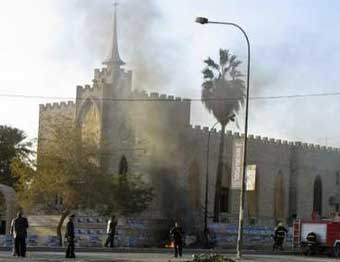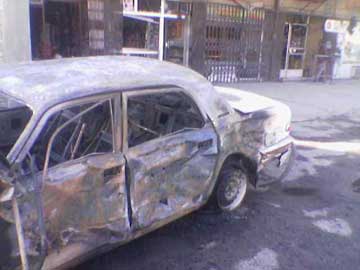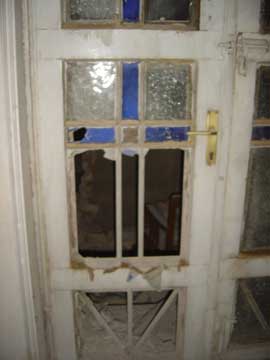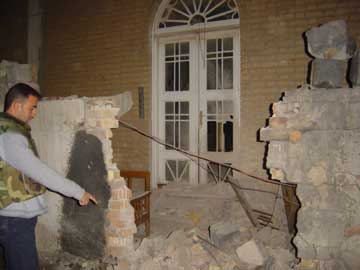


(AINA) -- On January 29, Assyrian Christian worshippers suffered yet another terrorist attack during Sunday mass as six synchronized car bombs (AINA 1-30-2006) exploded outside churches in Baghdad and Kirkuk. One Assyrian Christian was killed and a Muslim couple who resided near one of the churches as well, 9 others were injured. As in past Church bombings, bombs were synchronized to go off during Sunday mass in order to wreak maximum havoc and terror.
The ongoing campaign to terrorize and intimidate the indigenous Assyrian Christian (also known as Chaldeans and Syriacs) community of Iraq is widely believed intended to continue and accelerate the exodus of Christians from the country. Some Assyrians believe that the Church bombings may have been in retaliation for a Danish newspaper's publishing of cartoons (AINA 2-2-2006) depicting Muhammad. According to Swedish-Assyrian journalist Nuri Kino, "the Danish editorial illustrations of Muhammad have now reaped their first life...", adding "Several Islamic organizations have screamed for revenge against the Christians in Iraq who are viewed as representatives for everything Western."

According to Ankawa.com, On January 29, a group of enraged Muslim students at the University of Mosul attacked Assyrian Christian students. Apparently, several "fatwas" or religious edicts were issued by Islamic militias associated with Islamic religious schools or madrasses against Christians in Iraq.
During the attacks, Muslim students chanted anti Christian slogans declaring their victims "sinners, infidels, and agents of the West." According to reports, the attackers also urged the "expulsion of the Crusaders and sinners from schools and public institutions."
The belief by some that the Church bombings and student beatings were tied to the Danish newspaper cartoon controversy prompted the Assyrian Woman's Union and Iraqi Woman's Center to issue a statement on February 1 noting "We protest, along with our Muslim brethren in Iraq, the ill-mannered efforts taken in the Danish Press by individuals aiming to defame the image of the kind Arab Messenger Prophet. In addition, these crimes committed against a number of churches in Baghdad and Kirkuk are also devoid of any holy teaching."

Earlier, on January 29, the Ankawa Township Committee published a statement denouncing the attacks while reiterating that they have no connections to the journalists responsible for the cartoon controversy. Most disturbing to many Assyrian Christians inside as well as outside Iraq, however, remains the bitter irony that Assyrian Christians need suffer retribution for acts carried out by Western Christians when to many Assyrians, Western Christianity has simply abandoned them.
For other Assyrian analysts, the motivation for the Church bombings differs from the presumably fatwa driven student beatings. According to one analyst "The synchronization, sophistication, and multiplicity of targets suggest a more pre planned and premeditated attack." Moreover, "The attacks on January 29 are very reminiscent of the August 1, 2004 church bombings (AINA 8-1-2004). To date, 27 churches have been bombed in Iraq, and most predate the European cartoon controversy." The inclusion of Karkuk where two churches were bombed has raised suspicions during a period of increased Kurdish attacks against the Turkman, Arab, and Assyrian communities in a Kurdish bid to consolidate control over the oil rich city. The church bombings come on the heels of the assassination of Kirkuk police general Wael Joseph Jacob. Mr. Jacob was a prominent Assyrian who had of late been highly critical of Kurdish brutality in Kirkuk.
To many inside Iraq, there remains an insidious and systematic pattern of attacks designed to, as one resident complained, "terrorize, demoralize, and drive out Assyrian Christians." The campaign has thus far succeeded with over 40,000 leaving following the first wave of bombings in August 2004 alone (AINA 8-18-2004). Since that time, tens of thousands of others have fled as well. One activist noted that " it must be an embarrassment for the supposedly free and democratic government of Iraq as well as the US Administration that tens of thousands of Christians have chosen safe harbor in Syria of all places."
Irrespective of the terrorists' motivation, the net result is a very real threat to the future existence of Christianity in Iraq with accompanying profound reverberations for the region as a whole. Reacting to the deteriorating situation for Christians in Iraq, the World Evangelical Alliance Religious Liberty Commission labeled Assyrian Christians "endangered," stating "As people, groups, and whole communities start to identify by religious affiliation rather than their common Iraqi nationality, the Christian minority find themselves increasingly despised, marginalized and exposed. They are endangered, without equality before the (Islamic) law, having no clan networks and retaliation ideology, and lacking security in a lawless Islamic society." (AINA 2-2-2006)

The ongoing attacks against Assyrian Christians as well as overall Assyrian insecurity have bolstered Assyrian demands for a safe and secure self-administered area within the Nineveh Plain. The remaining towns and villages within the Nineveh Plain lie outside Mosul and adjacent to the historic ancient Assyrian capital of Nineveh. This string of Assyrian towns forms the last area that is predominantly Assyrian Christian in Iraq. According to Mr. Michael Youash of the Iraq Sustainable Democracy Project, "Development assistance for Assyrian Christians in the Nineveh Plain are sorely lacking. A well developed Nineveh Plain with adequate housing and infrastructure is the only hope to secure ChaldoAssyrian existence in Iraq. The hope is to have the capacity to absorb the tens of thousands already on the move within the country and to hopefully one day lure back those who have already left. Only by providing a secure, developed alternative to leaving where Assyrians are given the right to administer their own local affairs can we hope to entice those under threat to stay."
For those envisioning a future stable and progressive Iraq, the true litmus test for democracy and pluralism remains the fate of the Assyrians, the indigenous Christian community of Iraq.

or register to post a comment.